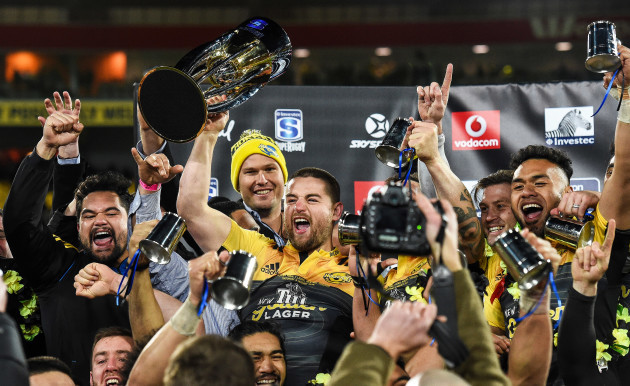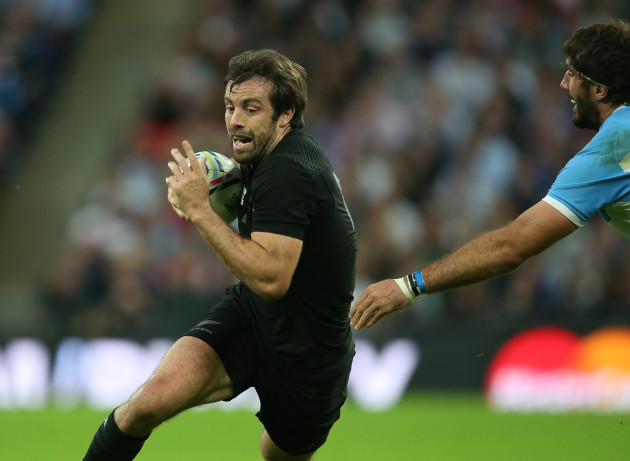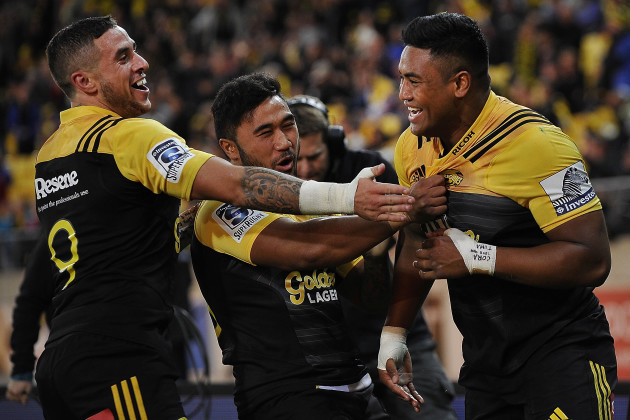Updated at 21.45
This post is part of The42′s Facing History series, supported by Cadbury Boost. To read more, click here.
IF YOU EVER happen to see Beauden Barrett walking around the pitch in his bare feet before a game and wonder what he’s doing, it’s related to a mental skills technique called ‘grounding.’
Barrett has worked on the technique with Irish mental skills coach Jason Brennan in recent years with the Hurricanes, who the Dublin native spent two and a half years working with from 2014 up to this year’s Super Rugby triumph.
“When the human system is over-active, there’s loads of chemicals swashing around the mind and body – cortisone and stuff like that,” explains Brennan.
“It means a person may not be thinking so clearly, so to help them cool their system down there are a number of techniques.”
One of those is ‘grounding,’ where the player attempts to shift the energy away from their head, which needs to be clear and calm. The part of the body furthest away from one’s head is their feet, so Brennan encourages the players to send the energy there.
Wiggle the toes, feel the feet, get sensation into the toes. Are they hot, cold, tingly?
“All the energy they’re sending down is taking away from their head and the chemicals are cooling down,” says Brennan. “They’ve brought themselves back into a less agitated state, calmer, more relaxed.
“Some of the players – especially those who do a lot of kicking – I invite them to walk around the pitch in their bare feet before a game, because they’re quite often out there for a long time before the game.
“Get a feel for what the grass is like, so then when they want to cool down later on, they just remember the sensation of the grass on their feet, and quite quickly they’re a bit cooler, a bit more connected.”
There’s very real science behind the technique, but it’s simple for a player to understand – something Brennan stresses as being key in his role as a mental skills coach.
A Dundrum boy who later moved to Stepaside, Brennan initially studied philosophy, before earning his B.A. in psychoanalysis. He also has qualifications as a mental skills and leadership coach.
Having moved to Wellington in 2000, he is part of the ThinkWell team, whose mission statement is “to help you personally or professionally achieve better results.”
Brennan has worked with police, fire and ambulance services, helping them to perform under pressure. He has also done large amounts of work in the areas of stress and resilience with corporate business and executive teams.
Sporting involvement has come with New Zealand’s national women’s cricket team, the White Ferns, as well as the Wellington football and netball teams.
His first foray into rugby was in Auckland with the Blues, before he put in a call to his local Hurricanes in 2014 to see if they had any need for his services as a mental skills coach.
Brennan – who has very recently relocated to Sweden, and can now regularly visit Ireland as a result – discovered that New Zealand rugby was completely open to the idea of improving the mental side of its game.
So while the All Blacks have been doing their own mental skills work at a high level for years, Brennan points out that that is reflective of the entire New Zealand rugby system. His belief is that this is a key strength of New Zealand rugby.
“In New Zealand rugby, they’ve got six pillars that represent their values. When I first started working in New Zealand rugby, that’s the first thing I checked out.
“Those values are technical, tactical, physical and nutritional, but the other two were the ones I was most interested in. Mental skills as a value or pillar – equal with all the others – and the other is called holistic leadership, so I thought ‘fantastic.’”
Brennan found that the Hurricanes players were largely hungry to work on the mental skills side of their game, with ex-All Black Conrad Smith being a particularly strong advocate.
That said, mental skills work was never forced on any players who had reservations. One meeting with Brennan was the minimum requirement for each squad member, while he ran collective workshops in areas like resilience and stress, culture and values, grounding techniques, visualisation, and self talk.
“A core component of mental skills is helping a player or person to become aware of their thoughts, so self-awareness,” says Brennan.
He attempts to help players to become aware of their ‘performance-interfering thoughts’ and build a system whereby they are actively promoting ‘performance-enhancing thoughts.’
“Performance-enhancing thoughts are fact-based,” says Brennan. “Maybe telling myself, ‘I’ve got a lot of experience in this,’ because I do.
“‘I’ve trained for this, I’m ready.’ If I haven’t done the training or skipped training and I try and tell myself that, my mind will say it’s rubbish. If I’ve put in the hours and it comes to game day I can call on that and it will help me perform.
“It’s not egotistical, because there’s been feedback from coaches that I’m good at this. It’s real and true. Those are performance-enhancing thoughts.”
Again, an understandable and straight-forward delivery of something that has a whole lot of human science behind it. Brennan is currently in the process of writing a book on mental skills, which he expects will be ready within the next six months.
The simplicity of delivery is a key focus for him in writing it.
“The language is very important,” says the Dubliner. “I’ve found that a lot of sports psychology books, for example, are very academic. It’s good stuff if you like to read academic stuff about sports psychology.
“For players it’s actually not that useful; it’s too much information and it’s not necessarily broken down into practical advice on what I need to do on the pitch – before I go out, or if I make a mistake.
“My aim is always to make it as practical and simple as possible because that works. It is really important that the language is user-friendly, so you can get a technique like grounding and do it straight away and see the difference, see how it helps.”
Brennan is of the belief that mental skills work is one of the most untapped avenues for improving sporting performance; indeed, for improving performance in any walk of life.
The fact that the Hurricanes displayed real mental resilience and such an outstanding collective bond during Brennan’s time with them strongly suggests that there is real value in the work he carried out.
Under head coach Chris Boyd, he helped to drive a consistent focus on implementing the cultural values the group had agreed upon at the start of each season. The presence of a mental skills coach ensured that sight of those values was never lost.
One of the other duties Brennan carried out was in the field of ‘energy sharing’ – another concept that seems simple and important when he explains.
“Rugby is an energy game, so having the team at the right level of energy for whatever the game is is so important. We’re energy creatures as humans, so we can share energy through communication.
“Communicating effectively is really important because it helps morale. One of the things I’m really hot on when working with teams is communication and connecting between players.
“When players or humans get a bit stressed, sometimes they can go quiet and that’s not so useful in the middle of a game when you want people chipping in with problem-solving or boosting morale.
“One of the things we did last season was to give ‘energy roles’ to people. Some players are very good at speaking up, but some of the players who are not so good at speaking up can show energy through their actions, their behaviour. They can bring intensity.
“I had a set of players who were given the mental skills role of ‘energy sharing.’ Part of their role is to make sure they’re speaking up, checking on each other, communicating.
“The ‘intensity-bringers,’ who are maybe not as good as speaking up, can contribute with big plays. These are some of the front rowers, maybe, who can do the big plays that change the energy of a game.”
It’s something the Hurricanes players wholeheartedly embraced and looking back on their games in this light, it’s quite easy to pick out the players who carry out each of these roles.
There is much more to the work Brennan does with sports teams, of course, but each of the techniques is presented in a similar manner, easily digestible for the players.
The Irishman is passionate about the field of mental skills and believes rugby, sport, and life in general has a long way to go in terms of grasping the value of training in this area.
“It shouldn’t just be held for the elite,” says Brennan. “This stuff works and the sooner you get it in place, the more it will help you to perform better as a person at whatever you want to do.”
The42 is on Snapchat! Tap the button below on your phone to add!



